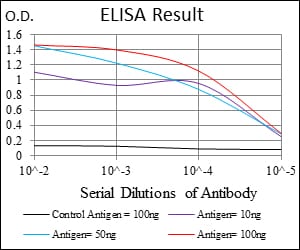
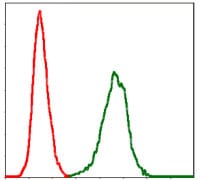
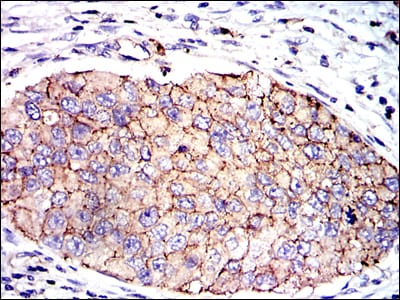
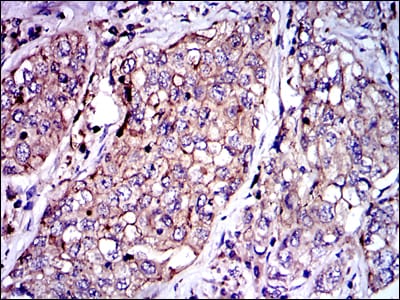
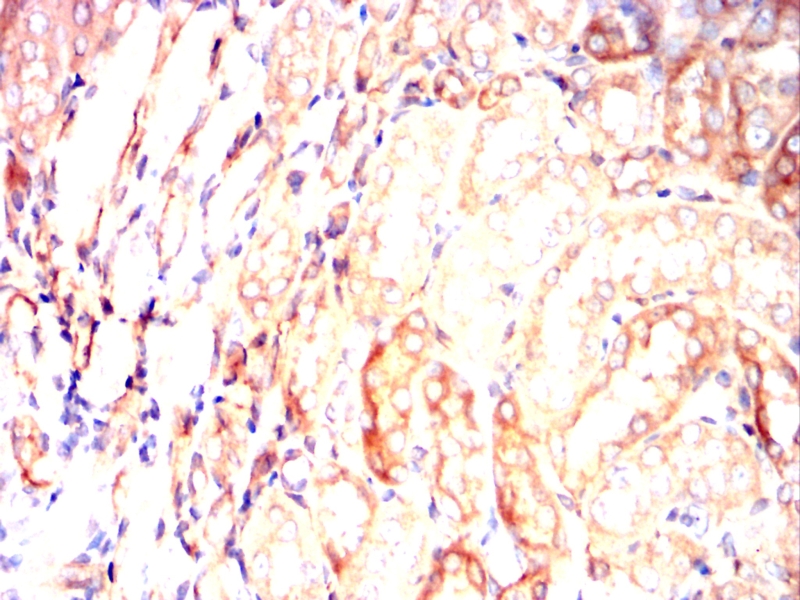
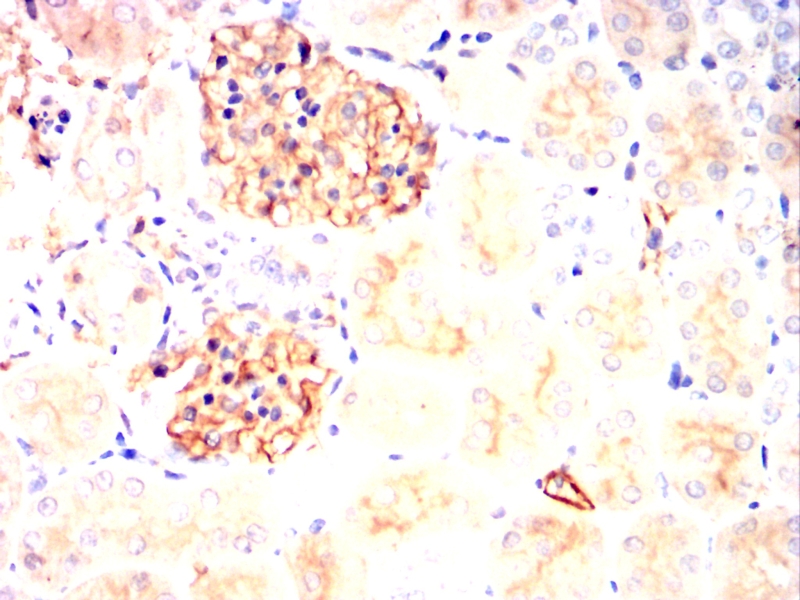
| WB | 咨询技术 | Human,Mouse,Rat |
| IF | 咨询技术 | Human,Mouse,Rat |
| IHC | 1/50-1/200 | Human,Mouse,Rat |
| ICC | 技术咨询 | Human,Mouse,Rat |
| FCM | 咨询技术 | Human,Mouse,Rat |
| Elisa | 1/5000-1/10000 | Human,Mouse,Rat |
| Aliases | PAI; PAI1; PAI-1; PLANH1 |
| Entrez GeneID | 5054 |
| clone | 1D5 |
| WB Predicted band size | 45kDa |
| Host/Isotype | Mouse IgG1 |
| Antibody Type | Primary antibody |
| Storage | Store at 4°C short term. Aliquot and store at -20°C long term. Avoid freeze/thaw cycles. |
| Species Reactivity | Human,Mouse,Rat,Rabbit |
| Immunogen | Purified recombinant fragment of human SERPINE1 expressed in E. Coli. |
| Formulation | Purified antibody in PBS with 0.05% sodium azide |
+ +
以下是3篇关于OSM(Oncostatin M)抗体的模拟参考文献示例(注:以下为虚构文献,仅供格式参考,建议通过PubMed或Google Scholar查询真实研究):
---
1. **文献名称**: *Targeting Oncostatin M Receptor to Suppress Inflammatory Arthritis*
**作者**: Smith A, et al.
**摘要**: 本研究开发了一种人源化OSM单克隆抗体,通过阻断OSM与OSMR/gp130受体结合,显著减轻小鼠胶原诱导性关节炎模型的关节炎症和骨侵蚀,提示其在自身免疫疾病中的治疗潜力。
2. **文献名称**: *Oncostatin M Neutralizing Antibody Attenuates Pulmonary Fibrosis in vitro and in vivo*
**作者**: Chen L, et al.
**摘要**: 实验证明OSM中和抗体可抑制TGF-β1诱导的成纤维细胞活化,并通过降低小鼠博来霉素模型中胶原沉积和炎症因子水平,为肺纤维化治疗提供新策略。
3. **文献名称**: *Anti-OSM Antibody Enhances Chemotherapy Response in Triple-Negative Breast Cancer*
**作者**: Gupta R, et al.
**摘要**: 研究揭示OSM抗体通过靶向肿瘤微环境中OSM介导的STAT3信号通路,增强三阴性乳腺癌对紫杉醇的敏感性,为联合治疗提供实验依据。
---
建议通过以下关键词在学术平台检索真实文献:
`Oncostatin M antibody therapeutic` `OSM neutralization inflammatory disease` `OSMR blockade cancer`
Oncostatin M (OSM), a member of the interleukin-6 (IL-6) cytokine family, is a pleiotropic cytokine involved in inflammatory responses, tissue remodeling, and immune regulation. It signals through two receptor complexes: the type I receptor (OSMRβ-gp130) and the type II receptor (LIFRβ-gp130), activating downstream pathways like JAK-STAT, MAPK, and PI3K-Akt. OSM is primarily produced by immune cells (e.g., T cells, macrophages) and stromal cells under inflammatory or fibrotic conditions. Dysregulated OSM expression is linked to chronic inflammatory diseases (e.g., rheumatoid arthritis, inflammatory bowel disease), fibrosis (e.g., lung, liver), and cancer progression, where it promotes cell survival, angiogenesis, and extracellular matrix deposition.
OSM-targeting antibodies have emerged as therapeutic candidates to block its pathogenic signaling. These antibodies inhibit OSM binding to its receptors, suppressing pro-inflammatory and pro-fibrotic cascades. Preclinical studies demonstrate efficacy in reducing inflammation and fibrosis in models of lung, liver, and skin diseases. Challenges include optimizing specificity to avoid interference with beneficial functions of related cytokines (e.g., LIF, IL-6) and managing potential side effects. Current research focuses on humanized monoclonal antibodies and bispecific formats, with early-phase clinical trials exploring their safety and effectiveness in conditions like idiopathic pulmonary fibrosis and autoimmune disorders. OSM antibodies represent a promising strategy for diseases with limited treatment options.
×